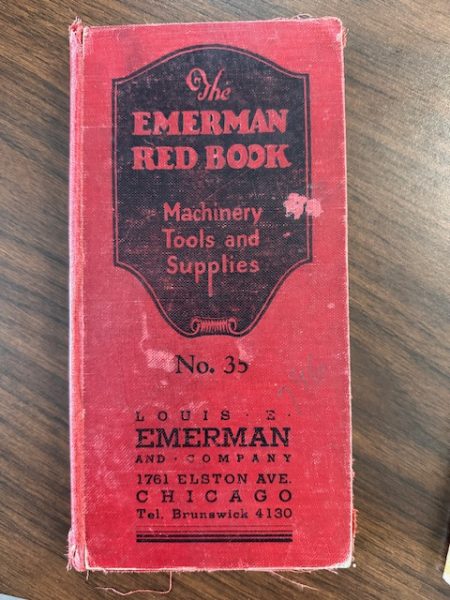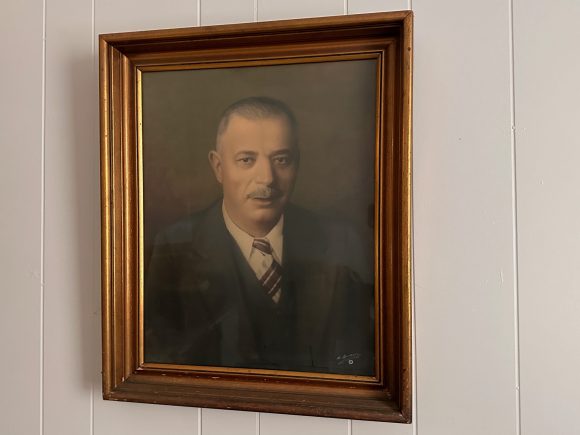Our used machinery business, Graff-Pinkert, is in the process of moving its headquarters down the street this week. Right now, I am sitting outside our warehouse with Noah, looking at my beloved 35-year-old apple tree, remembering the stories of the history of Graff-Pinkert.
It all began with my grandfather Louis Graff who I never met. I just packed up his portrait photo, which we never got around to hanging on our office wall, into the back seat of my car.
My dad, Leonard Graff, idolized his father and joined him in the scrap metal business after proudly graduating from the University of Chicago but unable to get a job in 1938. He learned a lot from his father, particularly how to haul other men’s junk and weighting the scales in your favor. It was a dirty game he knew was not for him. But he saw that guys who didn’t appear that brilliant made a lot of money running screw machines.

While in the scrap business, he became friends with the Blumberg brothers, used machinery dealers who owned Adams Machinery in Chicago, which still exists today. He partnered with them on some deals, and in a factory they were junking, he discovered the Emerman Red Book, a catalog which listed prices of machine tools, which he tucked away as treasure for future use.
In 1941, Louis Graff died of a heart attack. My dad was devastated but quickly rebounded. He soon met my mother, Thais, who was home for the summer from the University of Wisconsin. He liquidated the family scrap business and borrowed $5,000 from Chicago City Bank in Englewood on the sheer strength of his charisma. Then he went into the used machinery business.
He figured that any equipment he could buy for the price Emerman was selling it for in his depression era 1935 Red Book catalog he could make a profit on.
He folded his 6’6″ frame, carrying the Red Book and his confidence, and drove around Wisconsin, prospecting for machinery. He made calls from local telephone companies so he wouldn’t have to keep dropping in dimes.
He wholesaled most of his early purchases to the Blumbergs because they were easy to deal with and had plenty of money. Not long after he went into business, the Blumbergs asked my dad to fly with them in a private plane to Iola, Kansas, to evaluate the scrap at a factory they were buying (Iola is halfway between Wichita and Kansas City). It whet his appetite to be like them, although it scared the heck out of him to go up in a little airplane. I still often talk about that story.
As an aside, the senior Blumberg, founder of Adam’s Machinery, made enough money to go into the thoroughbred racing business. His horse, Venetian Way, named after the street in Miami Beach, won the 1960 Kentucky Derby after Lincoln Road finished runner-up in 1958.
This was the kind of history I grew up with as a child. My father loved the excitement of a deal and meeting interesting people along the way. But bedtime stories were about making deals.
My dad knew that because of his frequent mood swings he needed a business partner. His first was his Uncle Abe, a fat, balding older man who loved to laugh. He kept my dad’s spirits up and above all that was what he needed.
The story I remember most about his short partnership with Uncle Abe was their trip to Kalamazoo. Soon after they started calling local shops they found a milling machine, a precious Kearney and Tracker, which they quickly bought and flipped.
They were thrilled and wanted to celebrate. Abe knew the way. They went to the local ice cream shop and both ordered big thick chocolate milkshakes. They took them up to a rented hotel room and sipped.
That story has been passed through generations.
Abe and my father split soon after, but the story has lived on 80 years later. During World War II, my dad asked his cousin Aaron Pinkert to join him as they made bullets and other screw machine parts, putting aside the used machinery business. They made a lot of money and ran until 1949, quitting just before the Korean War.
If they had stayed for six months more, we might still be in the production business, but dad and Aaron were exhausted with that life and went into buying and selling apartment buildings and machinery. It was the beginning of Graff-Pinkert and Co.
Hope you like today’s family history lesson. Don’t forget to pass yours on to your kids.
Question: What family stories will you pass on to your kids?


8 Comments
None. We just sold the family business after 63 years because while the next generation worked there in college, wanted nothing to do with it. While they all have had multiple careers so far they will no longer have this safety net to fall back on…..
Very sad
That’s disappointing, but hopefully the legacy will last you well into retirement!
Dad getting us up on Saturday mornings in November to go rabbit hunting in NE Indiana (never heard of a deer season around here back then). He made a pan of oatmeal and we cut up dates (“product of Iraq” per the box) to put on it. Drive out into the country with us sons in the car, pull into a good-looking farm, then get out, walk up to the door with his shotgun to keep a farm dog from rushing him, and knock. Once in a while mom sent a homemade pie if we were going back where already welcome. About 50/50 it was “sure, try over there” in the late 60s – early 70s. We brothers would watch and could usually tell if it was yes or no. Imagine a guy knocking on your door with a shotgun in hand today!
Fantastic story, thanks for sharing
Hi Lloyd
I enjoyed your article. I also enjoy reminiscing on past accomplishments. I never thought I would be in this industry at age 70. I enjoy new challenges. I’m more of an entrepreneur than a manager. Go big or go home might be categorized as my playing style. Profits (money) allow me to stay in the game. Starting in business in 1978 I made over $100 an hour tig welding jet engine parts. I visited Tom Sims screw machine shop behind Mitchell & Scott in 1980. Tom had old model C 4 spindle acmes he would let run while he went to lunch. I thought “What an easy way to make a living” ………………………………..
Your comment “Are screw machine people not very smart?” I’ve found the very best people in this business to be very smart. Some are just not quick on their feet. It’s a technical business that has been difficult for VC’s to roll up.
Lloyd: Best wishes on your journey.. John
Thanks for sharing, John!
Correct me if I’m wrong, but you seem like a person that wouldn’t be in a business if were tooooooo easy, anyway! 😃
You’re too smart and interesting for that!
I have found screw machine folks quite sharp generally, John, you being one of them.
The remark was one that my Dad heard from his father picking up their scrap and playing with the scales. It was one reason he left the business as soon as Louis died.